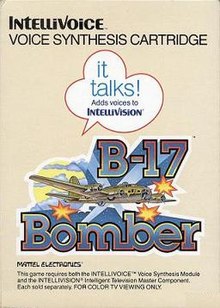B-17 Bomber (video game)
| B-17 Bomber | |
|---|---|
 Box art | |
| Developer(s) | Mattel |
| Publisher(s) | Mattel |
| Platform(s) | Intellivision |
| Release | |
| Genre(s) | Action |
| Mode(s) | Single-player |
B-17 Bomber is a single-player video game released by Mattel for their Intellivision console in 1982. The game was bundled with the Intellivoice voice synthesis module.[2]
Gameplay
In B-17 Bomber, the player controls a simulated bomber aircraft. The objective of the game is to complete missions by dropping bombs on targets in continental Europe, including anti-aircraft guns, airports, factories, and naval vessels.
The game plays like a rudimentary flight simulator, which models altitude, air speed, tilt and pitch, fuel consumption, and the effects of taking damage. Enemy planes occasionally attack the aircraft from any direction and must be shot down. The aircraft can also come under fire from flak guns on the ground, which can be taken out with a bomb. The game ends when the aircraft is destroyed.
When an enemy plane attacks, the Intellivoice module announces the direction of the attack, prompting the player to turn that direction in order to fire back. While the game is playable without the Intellivoice module, it becomes very difficult since the player is given no other audio cue that an enemy is approaching, and must guess which direction the attack is coming from.
Reception
Danny Goodman of Creative Computing Video & Arcade Games said in 1983 that B-17 Bomber was his favorite Intellivoice game, praising the voices and noting that the game and others "made the voice an integral part of game play".[3] B-17 Bomber was well received, gaining a Certificate of Merit in the category of "1984 Best Videogame Audio-Visual Effects (Less than 16K ROM)" at the 5th annual Arkie Awards.[4]: 42
References
- ^ "Intellivsion Game List".
- ^ "Intellivision". Electronic Gaming Monthly. No. 91. Ziff Davis. February 1997. p. 100.
- ^ Goodman, Danny (Spring 1983). "Home Video Games: Video Games Update". Creative Computing Video & Arcade Games. p. 32.
- ^ Kunkel, Bill; Katz, Arnie (January 1984). "Arcade Alley: The Arcade Awards, Part 1". Video. 7 (10). Reese Communications: 40–42. ISSN 0147-8907.
